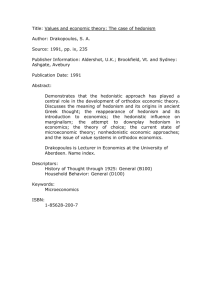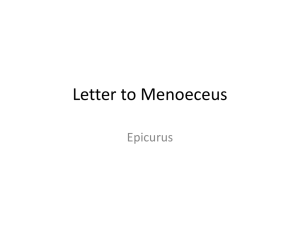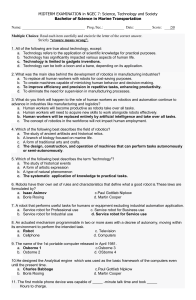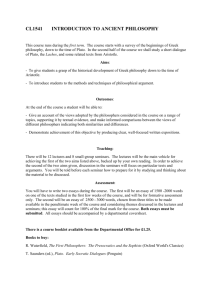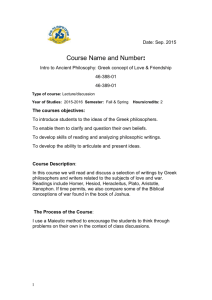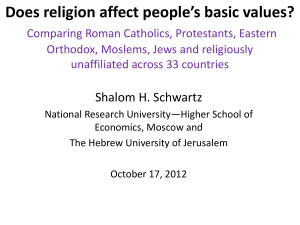Saturday, March 14, 2009 by Jonathan Paul There are many
advertisement
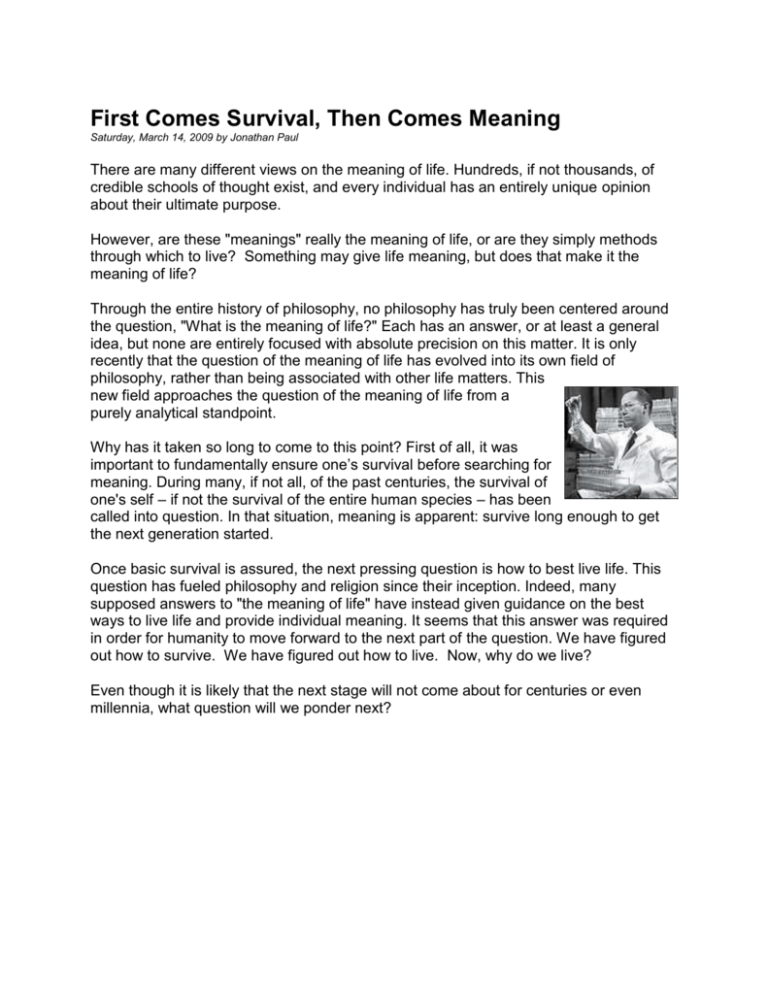
First Comes Survival, Then Comes Meaning Saturday, March 14, 2009 by Jonathan Paul There are many different views on the meaning of life. Hundreds, if not thousands, of credible schools of thought exist, and every individual has an entirely unique opinion about their ultimate purpose. However, are these "meanings" really the meaning of life, or are they simply methods through which to live? Something may give life meaning, but does that make it the meaning of life? Through the entire history of philosophy, no philosophy has truly been centered around the question, "What is the meaning of life?" Each has an answer, or at least a general idea, but none are entirely focused with absolute precision on this matter. It is only recently that the question of the meaning of life has evolved into its own field of philosophy, rather than being associated with other life matters. This new field approaches the question of the meaning of life from a purely analytical standpoint. Why has it taken so long to come to this point? First of all, it was important to fundamentally ensure one’s survival before searching for meaning. During many, if not all, of the past centuries, the survival of one's self – if not the survival of the entire human species – has been called into question. In that situation, meaning is apparent: survive long enough to get the next generation started. Once basic survival is assured, the next pressing question is how to best live life. This question has fueled philosophy and religion since their inception. Indeed, many supposed answers to "the meaning of life" have instead given guidance on the best ways to live life and provide individual meaning. It seems that this answer was required in order for humanity to move forward to the next part of the question. We have figured out how to survive. We have figured out how to live. Now, why do we live? Even though it is likely that the next stage will not come about for centuries or even millennia, what question will we ponder next? For Tomorrow We Die Saturday, October 25, 2008 by Jonathan Paul Be happy while you're living, for you're a long time dead. - Anonymous Scotsman There are so many ways to express this philosophy: Carpe Diem; Eat, Drink and Be Merry, for Tomorrow We Die; Memento Mori; Be Happy. These endeavors go on record as the most pleasurable search for meaning: hedonism, in which the main pursuit of life is pleasure. Hedonism espouses the fact that man is in essence selfish and lustful. Hedonism is often joined with utilitarianism, which claims that we should act based upon the best interest of the group, or on a grander scale, everyone. We seek good for both ourselves and our families. Coupling hedonism and utilitarianism, therefore, should result in everyone aiming for the happiness of everyone. Hedonism has a long history. As early as the 5th century BC, Democritus was advocating the chief goal of life being "contentment," long before Plato was advocating the relentless search for knowledge. Epicurus advocated a similar position a century later, emphasizing the highest pleasure of a simple, moderate life of friends and philosophical discussions. Of course, most people today would associate Epicurus with the term Epicurean and high dining. There are also those who would say that Freud was a proponent of hedonism. His description of a "life instinct" is very similar to the philosophy's claims that people pursue pleasure. Hedonism is closely associated with Egoism, a theory that claims that humans act solely in their own self-interest. They are sometimes combined and referred to as ethical hedonism. This combines ethical egoism, individuals seeking their own good, with hedonism. Ethical hedonism, in short, advocates that humans should rightly seek their own pleasure and act accordingly. It is important to distinguish, however, the search for pleasure from selfish acts. In order to contribute to one's meaning, the intention must be a pleasurable life rather than just a selfish, pleasurable act. To Be Selfless or Selfish Saturday, February 21, 2009 by Jonathan Paul In the beginning, there were people, and they were confused. They existed, they thought, they hunted, they gathered, they made more of themselves. However, why were they there? How were they there? How did the world around them exist? It is commonly stated that religion and faith came from an attempt by our ancestors to explain the world around them. However, it was also an attempt to explain themselves. The who, why, how, what and when of conscious life could not be known in their life experiences. Therefore, they created their own answers according to their worldviews. Religion and the associated stories answered all their questions. Where did you come from? Well, in the beginning there was a cosmic egg, or Chaos, or God, or the Word, or clay or darkness. From there, the stories spiraled to answer all your questions, from the meaning of life to how you should ensure your group's continued existence. The basic tenet of most Western theologies answers the question of the meaning of life: we exist to serve the higher power, i.e. God. The codicil to this meaning is that you serve God in order to make it to the next life, or more specifically, the better version of the next life. Few people serve a higher power in order to make it to Hell unless, of course, they are serving Satan, but that is another subject entirely. To be Rational is to be Good is to be...Confusing Saturday, October 11, 2008 by Jonathan Paul Know Thyself. ~ Plato No discussion of the meaning of life is complete without a discussion of perhaps the most influential of all Western philosophers: Plato. Student of Socrates, teacher of Aristotle, founder of the Academy, he has influenced countless generations of free thinkers and under-theinfluence philosophy students. His most famous quote, "Know Thyself," is not only a favorite of coffee shop artwork, but an extremely simple summary of his philosophical thoughts on the meaning of life. The foundation of Plato's philosophy is based on his Theory of Forms, an intense theory that nevertheless resonates. Forms, in essence, are unchangeable, untouchable types, or more clearly, Ideas. These ideas were not able to be sensed in the physical world. Rather, they are essences, typically described as aspatial and atemporal, that is, outside of space and time. They simply exist. Plato postulated that the forms existed in another part of the universe that is more pure than the space which we inhabit. In Plato's teaching, there exist ideal Forms which we cannot know, but for which we should nevertheless strive. The ultimate Form, which also informs all the other Forms, is the Form of the Good. In essence, the purpose of human beings is to pursue the Good with the only means available to us: intelligence and reason. The Form of the Good is also recognized as the highest form of knowledge. You must use your rational thought to pursue knowledge, through which search you will pursue the Good, which is what drives all that is good and valued in life. This may be confusing, but it simplifies to the fact that Plato believed each person must perform their own search for the Good, i.e. the meaning of life. Knowledge and rational thought were the keys, as a good student of the Socratic Method should know. There is little certainty in the philosophy of Plato, which makes it excellent reading for any student of the meaning of life. http://blog.funeducation.com/blog/the-meaning-of-life-explored Jonathan Paul is the Chancellor and a co-founder of FunEducation, Inc., one of the premier online testing providers of IQ tests, personality tests, career profiles and standardized practice materials.

